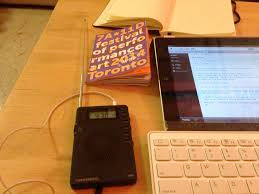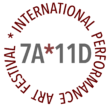By Alison Cooley

“We have never met. We don’t know each other. Whatever magic happens here has not been rehearsed,” says claude wittmann’s conversation partner today.
“I am in a little room with white walls, no windows,” claude describes. “There is a vent on top. My goal is to sit here and exchange something about equality and egalitarian actions. I want to collect a list of egalitarian actions, and we will choose one to do. I don’t have a list now.”
His guest asks claude why he moved to Toronto. He explains he had a growing preoccupation with the ethics of his work in molecular biology at the time. He and his guest exchange personal histories.
Is it an interview? What does it mean to speak with someone you do not know? Up until this conversation, I have not felt that wittmann’s project consists of interviews.
claude confesses that he had to prepare himself to see his guest (a figure who comes with some power and prestige in artist-run culture, who is tall and assertive, whose demeanor is masculine and scholarly.) This guest describes a project he attempted which engaged in non-argumentative exchange, with individual people encountering an archive of radical and artist-run culture. “Do you think we can still be utopian now, like you were then?” one of his attendees asked.
Is Radio Equals about the nature of conversation? I didn’t think so at first, but it seems to have become this. What do we receive in conversing with each other? Language has the potential to be so instrumental, tool-like, message-driven, devoid. How does information sit elsewhere in conversation? In the pauses, deflections, in incidental moments of static, in mouth-sounds?
I spoke to claude for a moment today, as I came in to pick up my portable radio. He said he had read my blog posts. He comments today on the feeling of having someone listening. I feel burdened and tense and hopeful to know claude knows I am listening.
His guest talks about the potential of sound, of radio, to convey a sense of communion, of closeness.
I listen to a lot of radio, and I have thought through my relationship to radio in ways I hadn’t anticipated in the past three days. My attraction to listening to radio has much to do with my own propensity towards anxiety— to wanting to hear others’ voices, to fill silence, to seek a resounding consensus (or test myself against voices I disagree with) in an ecosystem of sound. To think through positions I do not have the courage to try in the embodied world. To receive information. To quell fears of alienation and access social situations in a safe way, removed from actually having to be in the moment with another human. To know what to expect from others.
Radio Equals is a shattering reversal of what I have come to expect from radio. But it is enfolding in a new way.
I lose the signal.
When I come back in: “what is the difference between a sensation of equality and love? Is it too much?”
“How can you have a conversation and have trust immediately?” his guest responds.
claude asks, instead, for the two to try out how they could be unequal. Any number of ways. We exist in difference.
I lose the signal.
claude wittmann’s performance, Radio Equals, recurs daily at 3 pm until November 1 and is broadcast on 93.1 fm. The preceding is a short dispatch in response to today’s session.
